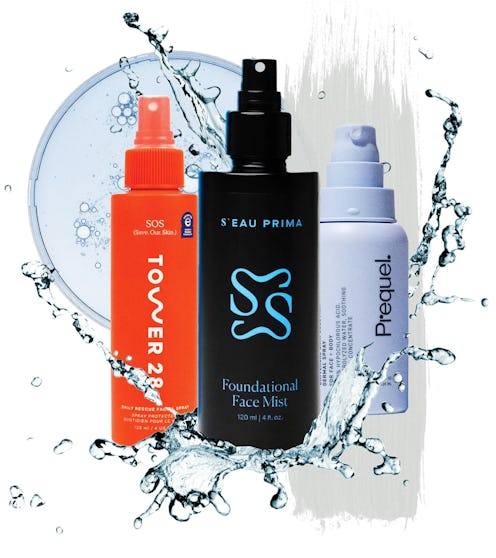(Back To Basics)
This Viral Skin Care Ingredient Hits Pause On Breakouts With Just A Spritz
And it’s great for sensitive skin.

With new products, brands, and categories popping up every day, beauty can be a bit overwhelming. Back to Basics is our rudimentary beauty series that serves as your crash course on the science behind some of the best formulations in the game. This week, we’re taking a look at hypochlorous acid.
If you’re on #skintok, you may have noticed an ingredient called hypochlorous acid popping up on your FYP. Always in spray form, content creators are often spritzing their faces after workouts, while playing sports, or just whenever they’ve spent the day sweating and need to freshen up. This is because hypochlorous acid is a molecule that’s essentially a disinfectant for your face. Yes, you heard that right. At first read, that might sound kind of intense, but the ingredient is actually quite gentle. Although it has similar antimicrobial properties to bleach, it has a completely different pH and chemical structure, so there’s no need to worry about it being too harsh or damaging to the skin. It’s a delicate extra cleansing step that is anti-bacterial, meaning it kills the bacteria that collects on your face throughout the day that can cause acne, breakouts, or exasperate other skin conditions.
“I think this has been a slept-on ingredient,” says founder of skin care brand Prequel and board-certified dermatologist at PotozkinMD Skincare and Laser Center, Dr. Sam Ellis, M.D. “It’s an easy on-the-go solution that helps address a wide variety of skin issues. It's also incredibly gentle and non-irritating, which makes it particularly great for sensitive skin.”
Still not sold? TZR spoke to Ellis and Founder of Fig.1, Dr. Courtney Rubin,M.D., a board-certified dermatologist at Comprehensive Dermatology Center of Pasadena, to give you a breakdown of the ingredient, its benefits, who should use it, and what products to shop.
What is Hypochlorous Acid?
According to Ellis, hypochlorous acid (HOCI) is a weak acid and antimicrobial molecule that is naturally produced by the white blood cells in your body. “It is the first line of chemical defense in the body against foreign pathogens,” she explains.
She says that its use reportedly dates back to World War I where it was used to clean wounds, but up until the last 10 years, it has not been a central component or popular ingredient in skin care products. “Its versatility is really incredible and is a major advantage,” says Ellis.
Rubin adds that hypochlorous acid is a great active for skin care because of how sensitive yet successful it is as a sanitizing and anti-inflammatory agent. “[It] can treat the bacterial overgrowth and reduce inflammation without harming the skin barrier or causing irritation,” says Rubin.
Who Should Use Hypochlorous Acid?
Experts say that hypochlorous acid would best serve those who struggle with conditions that are brought on by bacterial overgrowth like acne, rosacea, folliculitis/body acne, eczema, or redness. It helps to kill the bacteria that stimulates these issues while soothing soreness, tenderness, and overall irritation.
Ellis adds that patients who’ve added hypochlorous acid to their skin care regimen have reported improvements in itchiness, breakouts, body odor, and even wound care. “I use [it] countless times a day to prep my patients for in-office injectable treatments and laser resurfacing,” she says.
One thing Rubin notes is that most skin conditions are complex and need a multifaceted approach, so just using hypochlorous acid might not be enough to resolve conditions like acne, eczema, or rosacea entirely. “A holistic approach to treating these skin conditions will likely require a treatment strategy with several actives with different mechanisms of action, which can be managed by a board-certified dermatologist,” says Rubin.
How Should You Use Hypochlorous Acid In Your Skin Care Routine?
In terms of how to incorporate the ingredient into your skin care routine, Rubin says that she recommends spraying it on the areas that are affected by your skin condition, post-shower. After allowing the spray to dry down, you can go in with your regular skin care product regimen. “Avoid contact with eyes or mucous membranes, and avoid ingesting or breathing in the spray,” adds Rubin.
Because hypochlorous acid can deactivate antioxidants, Ellis says allowing the product to dry is super important before applying ingredients in this category like vitamin C.
The spray can also be used mid-day, as you would a hydrating face mist, for a quick cleanse. Think post-hot yoga session or mid-day summer walk. “I like to use this product, whenever I need a refresher,” says Ellis. “I use it after exercising to help cleanse my skin and I use it after washing my face — especially if I’m breaking out.”